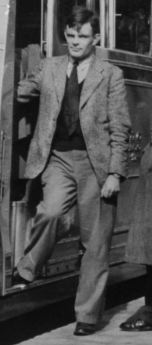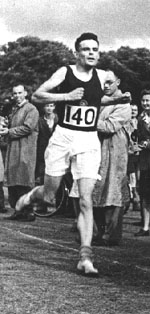

ALAN TURING - FATHER OF COMPUTING
Alan Turing is called a mathematician but his legacy reaches far beyond mathematics. In mathematics, this British scientist left his mark as the father of computing. He played a major role in the allied dominance of the waters in World War II. Thirty-three years after his 1954 death his ideas were communicated through a new medium, Broadway theatre. These events are all from a man who lived only 42 years due to British intolerance of homosexuality.
As a mathematician, Turing was an avant-garde thinker. One of his goals was to prove that mathematics is not all black and white, and that no one method works for all questions. It took many years after his death for his ideas and concepts to gain appreciation. His most important concept was the Turing Machine. In 1936 he designed, on paper, a machine that would scan symbols to decide what method could be used to solve a question. This machine and its functions are the direct predecessors to the American computer design which emerged ten years later.
As a noted mathematician, Turing worked for the British government during World War II. He was the first scientist employed in British cryptanalysis. As a result, Turing is an unknown hero for the allied forces. It is Turing who broke the Enigma Code used by German U-boats, allowing their locations to be found. This "saved uncountable lives, and assured allied supremacy of the seas."(1)
Not long after his efforts in the war, Turing was arrested due to his sexual orientation. The British government had little tolerance for homosexuality, and felt that Turing was a threat. Not even his good friend Winston Churchill could save him. Turing knew government secrets and was susceptible to blackmail. As a result, he was given the option of imprisonment or chemical castration. He chose to sacrifice his manhood, and the estrogen resulted in new found breasts. Less than two years later, Turing was tired of the intolerance of the world and committed suicide by eating an apple he had coated in cyanide.
Turing's full talents were not recognized within his lifetime, however, they have been noticed in recent decades. In 1987, Breaking the Code, a play by Hugh Whitmore was written about Turing. "Ordinary people - a theater audience- seemed to be fascinated by mathematics, by abstract scientific ideas."(2) This dedication from the arts show that Turing's contributions have finally been recognized.

1. Press, 346.
2. Press, 346.
WORKS CITED/CONSULTED
Clark, A. and Millican, P. J. R. (eds.). Machines and Thought: The Legacy of Alan Turing, vol. 1 Oxford: Clarendon Press. 1996. pages 1-9.
Press, Michelle. "Science Comes to Broadway." American Scientist. Volume 76, No. 4. July-August 1988. Page 346.
Hodges, Andrew. "Alan Turing: mathematician and computer builder." New Scientist. Volume 99, No. 1375. 15 September 1983. Pages 788-791.